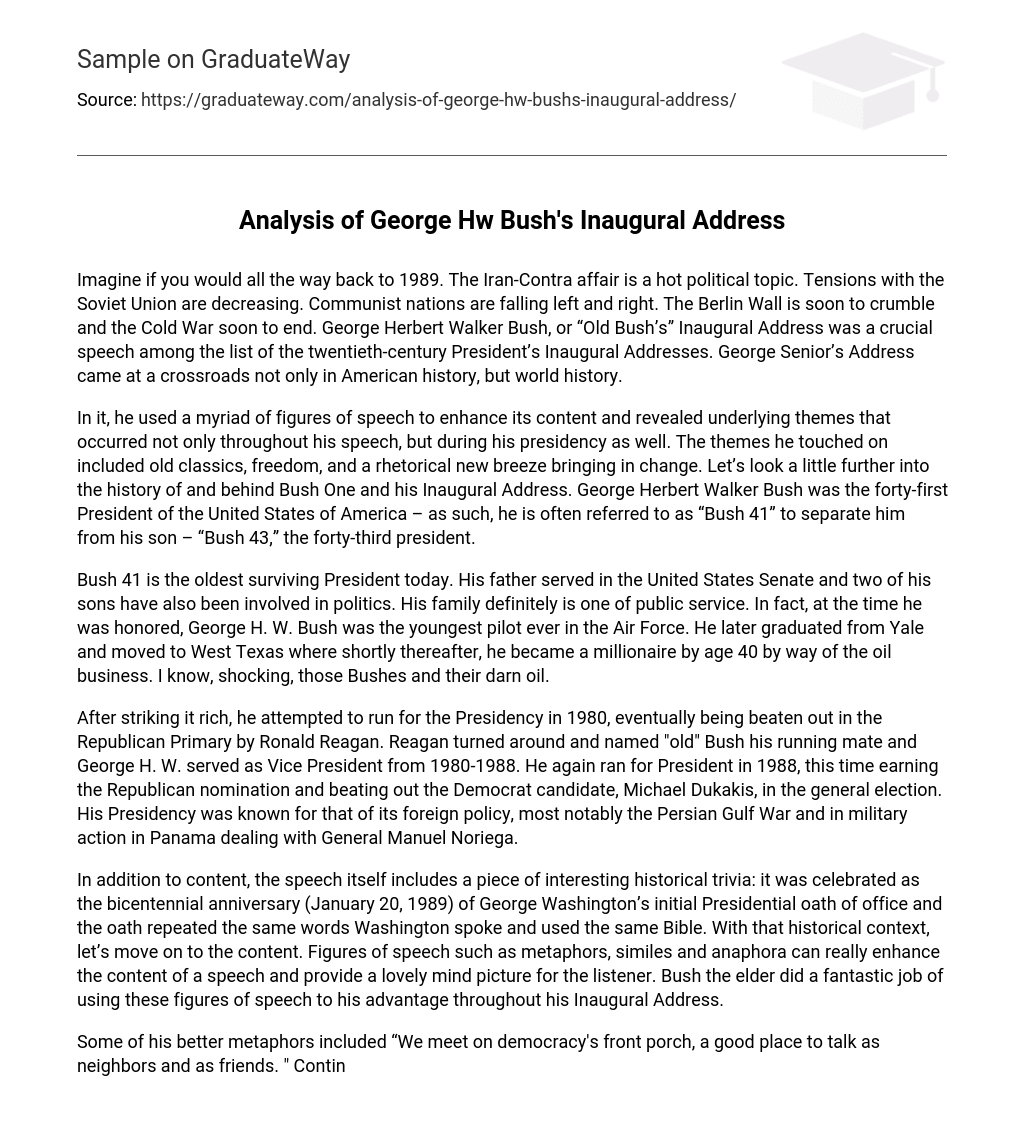During 1989, several significant events occurred, including the Iran-Contra affair, enhancements in relations with the Soviet Union, the breakup of communist nations, and the impending fall of the Berlin Wall. It was during this time that George Herbert Walker Bush, also known as “Old Bush,” delivered a highly important Inaugural Address which held significance both nationally and internationally.
George Herbert Walker Bush, also known as “Bush 41,” employed different figures of speech in his Inaugural Address to enrich the content and emphasize underlying themes. These themes consisted of allusions to traditional values, the idea of freedom, and the introduction of a fresh rhetorical style for change. To fully comprehend the historical significance and context surrounding Bush 41’s Inaugural Address, it is essential to acknowledge that he served as the forty-first President of the United States. This distinction distinguishes him from his son, who would later assume office as the forty-third president and is commonly referred to as “Bush 43.”
Bush 41, the oldest surviving President today, hails from a family with a rich tradition of public service. His father served in the United States Senate, and two of his sons have followed suit in pursuing political careers. Importantly, George H. W. Bush accomplished an extraordinary feat by becoming the Air Force’s youngest pilot, earning well-deserved recognition for this achievement. Following his education at Yale University, he moved to West Texas where he amassed great wealth before turning 40 through his active involvement in the oil industry. The profound association between these Bushes and oil is undeniably remarkable.
Despite his wealth, he ran for the Presidency in 1980 but lost to Ronald Reagan in the Republican Primary. Nevertheless, Reagan chose George H. W. Bush as his Vice President and he served from 1980-1988. In 1988, he made another bid for the Presidency and won the Republican nomination by defeating Michael Dukakis, who was the Democratic candidate, in the general election. Throughout his time as President, he focused on foreign policy matters, particularly concerning the Persian Gulf War and military intervention in Panama to address General Manuel Noriega.
The speech not only contains fascinating historical facts, but it also celebrates the 200th anniversary (January 20, 1989) of George Washington’s first Presidential oath. The same words and Bible that were used by Washington were repeated in this oath. Now, let’s concentrate on the substance. Figures of speech such as metaphors, similes, and anaphora greatly improve the speech and generate vivid mental pictures for the audience. Bush senior effectively utilized these figures of speech to his benefit in his Inaugural Address.
Some of George W. Bush’s notable metaphors include, “We meet on democracy’s front porch, a good place to talk as neighbors and as friends.” He also said, “But this is a time when the future seems a door you can walk right through into a room called tomorrow.” Furthermore, he stated, “…nations of the world are moving toward democracy through the door to freedom. Men and women of the world move toward free markets through the door to prosperity. The people of the world agitate for free expression and free thought through the door to the moral and intellectual satisfactions that only liberty allows.” These quotes demonstrate Bush’s adeptness at using metaphors to create vivid imagery. His words make it feel as though the listeners are actually on the front porch, preparing to enter these metaphorical doors. Additionally, Bush used a couple of similes that resonate with me, including, “The totalitarian era is passing, its old ideas blown away like leaves from an ancient, lifeless tree.”
The text highlights the use of similes in H.W.’s speech, noting their rarity coming from an older white man instead of a rap artist. The similes create vivid imagery and foster shared understanding rather than presenting dry facts. Moving on to the themes of H.W.’s address, his term coincided with major global changes such as the end of the Cold War, communism’s collapse, and the fall of the Berlin Wall. These transformations were referred to by H.W. as a “new breeze,” mentioned four times throughout his speech. Another recurring theme was freedom, encompassing free markets and expression.
The author makes multiple references to freedom in the following paragraph, emphasizing its importance in his speech. He states, “We know what works: Freedom works. We know what’s right: Freedom is right. We know how to secure a more just and prosperous life for man on Earth: through free markets, free speech, free elections, and the exercise of free will unhampered by the state.” Through repetition of the words “freedom” and “free,” the author underscores the significance of this theme to his listeners.
The theme of this text surpasses the mere reiteration of American values. The United States and the Soviet Union both held global superpower status for a considerable period, but their era was approaching its conclusion. Bush aimed not only to establish his desired theme for his administration, but also to shape the emerging global stage by emphasizing that democracy and freedom prevailed in the ideological struggle. Rather than facing off against an equal opponent, our attention must now be directed towards integrating the second and third worlds into our society.
Analyzing George Herbert Walker Bush’s Inaugural Address from a historical perspective reveals its significant role in shaping American history. The address emphasizes the importance of freedom during a period of global transformation, as evident through the use of figures of speech and explored themes. Despite his short four-year term, Bush’s Inaugural Address remains crucial and highly relevant to our nation at that time.





